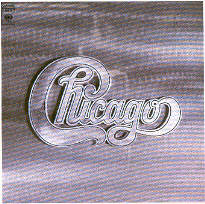 CHICAGO II CHICAGO II
Release Date: January 1970
Cover Design: Steel
Proves Cover Theory: Yes
Becky Rating: VIII.V out of X
I do love this album. The first 5/8 of it, at least. It sputters out at the end, but the first record, and the first two songs on the second, are Chicago at its very best.
I call II Chicago's "Hippie Album" because it, more than any other, reflects what was going on in America in 1970. (Not that I remember it, of course...) Here you will find:
*Vietnam War protest songs, to which the entire fourth side is devoted. A long suite called It Better End Soon is followed by Peter Cetera's first composition, Where Do We Go From Here;
*Psychedelia. The trip-inspired lyrics and music of Fancy Colours wouldn't seem out of place on a Dead album or at a live Dead show. And don't you think a certain cat food company should buy the rights to this song? I can hear it now: "Faaaaaancy Feast, Faaaaaancy Feast/Is all we ever eat/Whenever we're called to eat/We eat things so very fine when we eat" (OK, maybe not);
*Socially conscious lyrics. Poem for the People contains my single favorite line from a Chicago song, "The world's a funny place, you know/Most of what goes on is rarely funny." It's followed by In The Country, a Woodstock-style hymn to nature that ends with a Dixieland-style horn break. It's my favorite Chicago song of all;
*Beatlesque pop songs. Doesn't the beginning of The Road remind you of With A Little Help From My Friends? Wake Up Sunshine, one of Robert Lamm's sweetest songs ever, is almost a direct parody of Good Day Sunshine, even down to the descending bass line;
*The self-referential songs Chicago is so famous for. Movin' In again introduces the band and its purpose for existing (but why did Walt Parazaider play that horrid solo?), The Road is about groupies, and 25 or 6 to 4 is about the process of writing a song;
*Ah yes, the by-now-ubiquitous 25 or 6 to 4, which you can hear every day on classic rock radio stations across the country. Is this Chicago's most overplayed song? Probably; but remember, that famous (but very simple) guitar riff that opens the song was written by the band's keyboard player. That's how musically deep this band was;
*Finally, there's James Pankow's masterpiece, the Ballet for a Girl In Buchannon suite which takes up most of the second side of the first record. Make Me Smile is one of the few love songs I like, with a great horn part; Lee Loughnane gets a solo in Anxiety's Moment; the band goes back to Bach in both West Virginia Fantasies and Colour My World; and I always thought To Be Free would have made a great theme song for a police show. (Doesn't it remind you a little of the CHiPS theme?)
The only sour note on this album comes during Terry Kath's Mourning suite. The orchestral pieces seem out of place, and Memories of Love is one of the most mawkish things I've ever heard. Kath, like Bob Weir, Harry Casey and Maurice White, was meant to sing up-tempo songs, not ballads. One could also argue that It Better End Soon is out of date; however, Robert Lamm was smart enough not to refer to specifically to Vietnam. The lyrics could be applied today to regional conflicts, or to such concepts as racism, sexism, and general government corruption.
I've always said the perfect early Chicago album would be the first record of CTA and the first record of II together. Maybe II is slightly dated, but that horn part at the end of In The Country gets me every time. I think I'll go put it on now. It'll be sure to make me smile.
(C) 2001 Becky Banfield for Dos Gardenias Productions
Back to Chicago Album Review Index
Back to Chicago Homepage
Back to Music
Happy Cause I'm Going Home
|